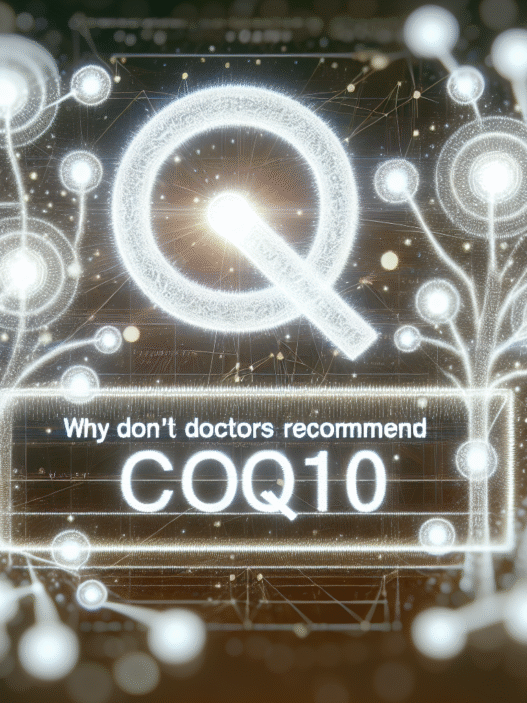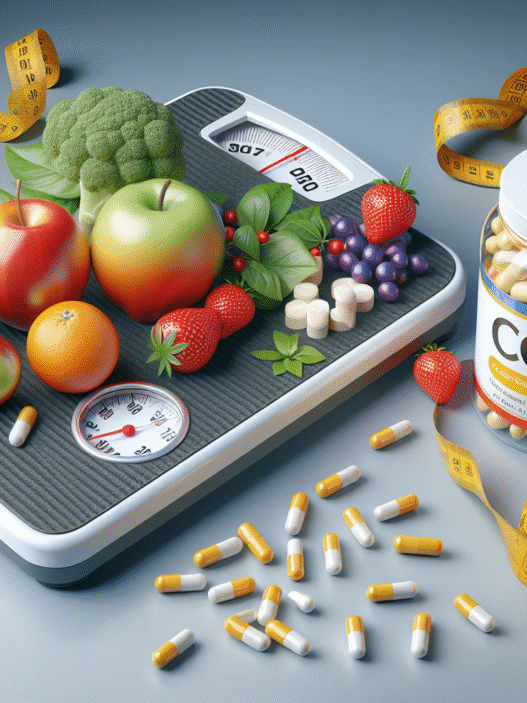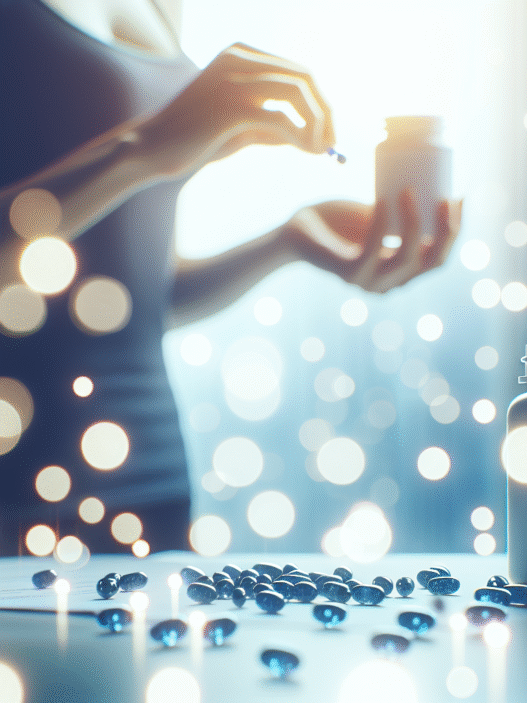CoQ10 Overview
What’s the Deal with Coenzyme Q10?
Coenzyme Q10, or just CoQ10 for short, is like the unsung hero hanging out in your cells. It is your cell’s sidekick, powering up energy production while shielding them from damage caused by those pesky free radicals. Now, here’s the kicker, as you hit mid-twenties, your body’s natural CoQ10 levels begin to take a nosedive. By the time you’re 30, your skin’s stash of CoQ10 starts running low, and by 66, your overall production plummets to half. It’s like your body’s midlife crisis coming early! Understanding this becomes key, especially for the crowd aged 35 to 65 who are all about keeping youthful and fighting the flab (Mayo Clinic, Life Extension).
When it comes to organs that are energy-hungry, like the heart, having low CoQ10 is not ideal. Especially for the golden oldies, and those taking cholesterol meds, topping up on CoQ10 might be the way to dodge some health problems and bring those levels back where they should be.
Why CoQ10 Matters as You Age
Getting older means having less of that CoQ10, and that might just open the door to all sorts of troubles, from cellular chaos to DNA deterioration thanks to those villainous free radicals. This dip can really mess with your body’s ability to keep the energy flowing and look after your heart. The science folks say older adults should think about getting at least 50 mg of CoQ10 in their diets daily. It’s their secret weapon against falling production levels and for keeping things ticking smoothly.
Popping CoQ10 supplements has its perks – from giving your heart a boost to revving up your energy and even getting more out of your workout sessions. If you’re weighing up CoQ10 supplements, it’s good to take a close look at your overall health scene, especially as the years add up and the waistline’s about ready to hit reset. For a quick lowdown on what CoQ10 can actually do for you, swing by and check our page on what is coq10 recommended for?.
In a nutshell, CoQ10 is a big player in keeping you well as you age. For anyone out there trying to fight back the clock and maybe shed some pounds in the process, knowing about CoQ10 isn’t just smart, it’s essential. If you’re curious whether you might be running low on CoQ10, don’t miss our article on what are the symptoms of needing coq10?.
CoQ10 and Absorption
Making the most out of CoQ10 starts with knowing how it gets absorbed in the body. Since CoQ10 dissolves in fat, understanding this helps in tapping into its full potential.
Fat-Soluble Charm
When CoQ10 is described as fat-soluble, it means it mixes well with oils and fats. So, to really get the benefits, it’s wise to pair CoQ10 supplements with meals loaded with healthy fats. Imagine a delicious meal of olives, coconut oil, avocados, nuts, or salmon — these not only taste great but also make CoQ10 work its magic much better (Nature Made, Rogers Pharmacy).
| Fat Source | Benefits |
|---|---|
| Olives | Loads your meal with fats that help you soak up nutrients. |
| Coconut Oil | Has fats that act like a sponge for nutrients. |
| Avocados | Brings healthy fats and vitamins to the absorption party. |
| Nuts | Filled with good fats and proteins, adding health perks. |
| Salmon | Omega-3 rich and an absorption booster for your body. |
What Affects Absorption
A few things can change how effectively CoQ10 makes its way into your system. Think of taking CoQ10 without any food — not the best move due to its love for fat. So, lunch or dinner with plenty of fats helps a lot (Mount Sinai).
Other things that play a role include:
- Supplement Type: Some brands, like MitoQ, offer a twist—they dissolve in water. This means you don’t need fats, and you have a bit more freedom with your meal timing, whether that’s 30 minutes before or 2 hours after eating (MitoQ).
- Health Conditions: If you’ve got other health matters on your plate or you’re on meds like statins, your CoQ10 routine might need a tweak (what happens if you don’t take coq10 with statins).
Getting these details right means you can really bank on the perks of CoQ10. For more insights into why CoQ10 is such a powerhouse, check out our section on what is coq10 recommended for? or see what food is highest in coq10.
CoQ10 Supplements
CoQ10 supplements are a hit among the 35 to 65 crowd, especially those worried about aging and weight loss. Knowing which CoQ10 forms are out there and how much to take can steer folks toward smart choices for supplementing.
Forms of CoQ10
CoQ10 mostly comes in two flavors: ubiquinone and ubiquinol. Ubiquinone wears its oxidized coat, while ubiquinol rocks the reduced style. Science says ubiquinol gets into the bloodstream more easily, meaning it might pack a bigger punch for those wanting to up their CoQ10 game (Life Extension).
| Form | Description | Absorption |
|---|---|---|
| Ubiquinone | Oxidized, often seen in supplements | Moderate |
| Ubiquinol | Reduced, more easily absorbed | High |
Recommended Dosages
How much CoQ10 should you take? It can vary, depending on what your body needs. Even doses up to 1200 mg per day seem alright (Nature Made). Here’s a cheat sheet on dosages based on common needs:
| Health Goal | Dose Range |
|---|---|
| General Well-being | 100–200 mg/day |
| Heart Backup | 200–400 mg/day |
| Statin Support | 300–600 mg/day |
| Athletic Boost | 200–1200 mg/day |
Chugging some CoQ10 daily can help fuel your cells, handy for regular gym-goers or those with low levels thanks to statins. It’s smart to chat with a doc to nail down the right dose that jives with your health and goals.
Curious why CoQ10’s the buzz? Check out what is CoQ10 recommended for?.
Benefits of CoQ10
Coenzyme Q10, or CoQ10 for short, is like a secret superhero for adults aged 35 to 65 who are eyeballing the effects of aging and trying to shed a few pounds. Being an impressive antioxidant, CoQ10 is a big player when it comes to energy production and feeling good overall.
Heart Health
When it comes to your ticker, CoQ10 is kind of a big deal. Studies suggest that taking CoQ10 might give your cardiovascular system a boost, especially if you’ve got a pre-existing heart condition. It helps make adenosine triphosphate (ATP)—think of it as a mini fuel cell for your heart. More ATP means your heart muscles work better, your blood pressure stays in check, and overall things run smoothly in there. But here’s the kicker: as you age, your natural CoQ10 drops. So supplementing can be a smart move as you get older. Curious about all the ways it can help? Peek at what is coq10 recommended for?.
Exercise Performance
Ready to level up your workout game? CoQ10 could be your new best friend. Research shows it might help you push the limits in the gym without getting wiped out as quickly. It’s a hit among fitness fans who want more oomph and less post-exercise downtime. For those shedding pounds, it might make exercise more effective and recovery speedier. Want to dive into how it ties to weight loss? Check out CoQ10 can help with weight loss.
Mood Enhancement
Want to shake off a bad mood? CoQ10 might just be what the doctor ordered. Its antioxidant goodness can cut down on oxidative stress—a mood wrecker known for breeding anxiety and depression. With more ATP available, you may find yourself feeling a pep in your step and a mental reboot. Getting your mood and brain fog under control might even lead to fewer blah days. Keeping enough CoQ10 in your system can be a game-changer for keeping your mind sharp and mood steady.
Incorporating CoQ10 into your daily routine could mean you’re stepping into a healthier future with better days ahead. For an inside scoop on signs that might spell out your need for CoQ10, swing by what are the symptoms of needing coq10?.
Timing Your CoQ10 Intake
Getting the timing right for CoQ10 can amp up its benefits. We’re about to hit the question of whether a morning gulp or an evening dose is your best bet, along with some tips to keep in mind.
Morning vs. Evening Dosing
Deciding whether to pop that CoQ10 pill in the morning or save it for nightfall is a personal call. Some research says that taking it in the morning might give you that extra pep in your step for the day. CoQ10 helps crank out cellular energy, so a bit of morning CoQ10 might just be the ticket for jump-starting your day and boosting workout mojo (Nature Made).
But, if CoQ10 hits you like a jolt of java, you might wanna wait until later. Taking it in the evening could work better if your other supplements or meds need their own schedule (Cibdol).
| Time of Day | Benefits |
|---|---|
| Morning | Keeps you energized all day, pumps up workout endurance |
| Evening | Ideal if CoQ10’s energizing effects keep you awake; fits in with other supplements |
Factors to Consider
Several factors can play into when you should snag your CoQ10:
- Energy Levels: If CoQ10 fires you up, a morning dose might be perfect. But if you’re one of those folks who don’t feel an energy rush, later in the day might work better.
- Medications and Supplements: CoQ10 can mix it up with stuff like statins, so timing is everything to dodge side effects. Curious about if you need CoQ10 with statins? We’ve got the scoop here.
- Eat Your Food: CoQ10 loves to tag along with a meal—especially one with some fat. So, time your dose with chow-time for the best absorption.
- Workouts: If you’re active, a morning dose might keep you cruising through the gym. If the evening is your sweat time, take CoQ10 before hitting it hard.
- Health Aims: Got specific goals, like keeping your ticker in tip-top shape? Stick to a consistent schedule. Dive deeper into CoQ10’s perks here).
Think about these tidbits to figure out whether a morning or evening routine is your jam. No matter your choice, sticking to your schedule is key to getting the most out of CoQ10.
Best Practices for CoQ10 Use
CoQ10 with Food
Getting the most out of CoQ10 means pairing it up with some grub, especially the greasy kind because it dissolves in fat. Simply put, mix it with things like olive oil, avocados, nuts, or fish like salmon – and voilà, your body will thank you.
| Food Category | Examples | Fat Content (per serving) |
|---|---|---|
| Healthy Fats | Olive Oil, Avocado | 14g (2 tbsp), 15g (1 medium) |
| Nuts | Almonds, Walnuts | 14g (1 oz) |
| Fatty Fish | Salmon, Mackerel | 10g (3.5 oz) |
Consistent Supplementation Schedule
Sticking to a routine with CoQ10 isn’t just a good idea—it’s a game-changer. Lock it in as part of your mealtime habits and you’re less likely to forget about it. The go-to move? Pair CoQ10 with a splash of water and those healthy fats we mentioned (Nature Made).
- Your Daily Routine:
- When: Breakfast or lunch
- Paired With: Fatty meal
- How Often: Every day
Being regular with it is key to tapping into its best features, especially if you’re on the aging train or looking to manage weight.
Considerations for Optimal Absorption
While munching is crucial for CoQ10, watch out for other players that might mess with its mojo. Some multivitamins might not mix well, so it’s a good idea to peek at what shouldn’t tag along with CoQ10 here.
Folks using statins might need to up their CoQ10 game. Statins can zap those blissful levels, so don’t shy away from chatting with a health expert about bumping your CoQ10 intake.
There are also forms of CoQ10 like MitoQ, designed to be absorbed more easily – no snacks needed. Best taken 30 minutes before or two hours after chow time.
Stick to these tips, and you’ll be riding the CoQ10 wave to better health in no time.





















